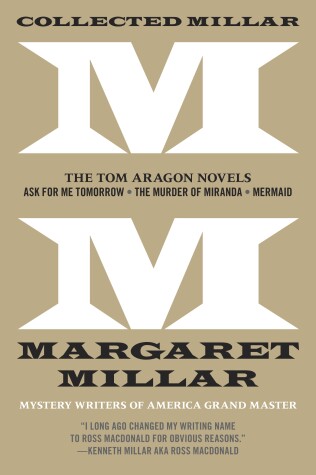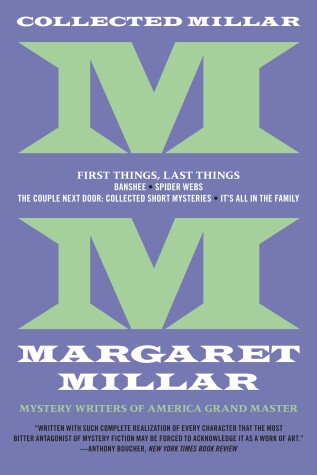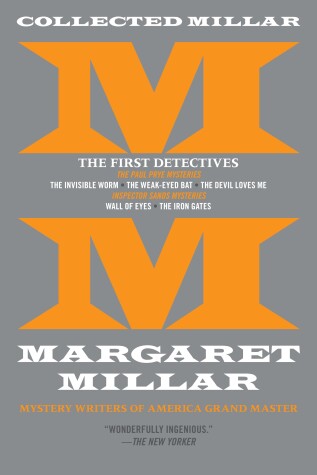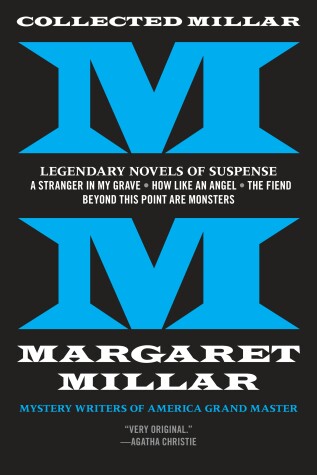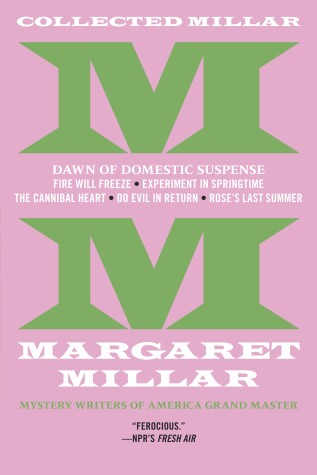Collected Millar
6 total works
The Tom Aragon Novels: Ask for Me Tomorrow; The Murder of Miranda; Mermaid
by Margaret Millar
Published 10 January 2017
Fast talking Tom Aragon, a Mexican-American lawyer turned private investigator, finds himself investigating a trio of missing persons’ cases in the always bizarre California hills.
One of Millar’s few reoccurring characters and her only foray into the tradition of Chandler and Hammett, Tom Aragon, ranks among her best creations. A sarcastic but talented young lawyer with a few rough edges, Aragon finds himself navigating one entitled nest of vipers after another, not to mention racial prejudice, in three of Millar’s most unusual stories.
Ask for Me Tomorrow (1976)
Gilda Decker needs a new bag, what with her second husband being suddenly crippled and her ex-husband hiding himself and his money somewhere in the hinterlands of Mexico. Gilda's recently retained lawyer, Tom Aragon, Mexican himself, is the best man for the job. But the deeper Aragon digs into her ex-husband's past the more dangerous his job becomes.
The Murder of Miranda (1979)
Miranda Shaw and Grady Keaton should have made for a run-of-the-mill scandal at the prestigious Penguin Beach Club. Shaw, a recently widowed woman of fifty, was seen leaving the club with Keaton, a ruggedly handsome lifeguard half her age. When Miranda and Keaton go missing, the widower’s lawyer sends his handiest man to find out where they’ve wandered off to. The clues come one stranger than the next for Tom Aragon in this often-hilarious novel of folly among the California elite.
Mermaid (1982)
Cleo Jasper is as beautiful as she is simple-minded—and now, she’s missing. Her doting brother will stop at nothing to find his defenseless sister, who fears the worst. Enter Tom Aragon, who is retained to track her down and return her to safety. Aragon soon realizes that he has once again found himself in over his head when Cleo's friend turns up dead amidst a sea of somewhat dubious suicide notes.
One of Millar’s few reoccurring characters and her only foray into the tradition of Chandler and Hammett, Tom Aragon, ranks among her best creations. A sarcastic but talented young lawyer with a few rough edges, Aragon finds himself navigating one entitled nest of vipers after another, not to mention racial prejudice, in three of Millar’s most unusual stories.
Ask for Me Tomorrow (1976)
Gilda Decker needs a new bag, what with her second husband being suddenly crippled and her ex-husband hiding himself and his money somewhere in the hinterlands of Mexico. Gilda's recently retained lawyer, Tom Aragon, Mexican himself, is the best man for the job. But the deeper Aragon digs into her ex-husband's past the more dangerous his job becomes.
The Murder of Miranda (1979)
Miranda Shaw and Grady Keaton should have made for a run-of-the-mill scandal at the prestigious Penguin Beach Club. Shaw, a recently widowed woman of fifty, was seen leaving the club with Keaton, a ruggedly handsome lifeguard half her age. When Miranda and Keaton go missing, the widower’s lawyer sends his handiest man to find out where they’ve wandered off to. The clues come one stranger than the next for Tom Aragon in this often-hilarious novel of folly among the California elite.
Mermaid (1982)
Cleo Jasper is as beautiful as she is simple-minded—and now, she’s missing. Her doting brother will stop at nothing to find his defenseless sister, who fears the worst. Enter Tom Aragon, who is retained to track her down and return her to safety. Aragon soon realizes that he has once again found himself in over his head when Cleo's friend turns up dead amidst a sea of somewhat dubious suicide notes.
First Things, Last Things: Banshee; Spider Webs; It's All In The Family; Collected Short Fiction
by Margaret Millar
Published 10 April 2018
A treasure trove of Millar rarities join her final novels to form a collector’s dream anthology.
Perhaps no other installment in Collected Millar displays the staggering variety of form and ranging interests of Margaret Millar as the present volume. On one end readers will find her final two mystery novels, which display the hallmarks of the writer in her heyday; the sharp social commentary and poignant black humor both well-couched in a brilliantly devised plot. The other end of the collection sees her collected shorter works, which includes the return of two fan favorites, Dr. Paul Prye and Inspector Sands. Last but certainly not least is her darkly humorous autobiographical children’s novel.
Banshee (1983)
The moral hypocrisy of society’s upper crust is laid bare when the untimely death of the young daughter of wealthy Californian landowners slowly destroys the community that loved her in life.
Spider Webs (1986)
The motives and prejudices of twelve jurors are on full display in the case of a Caribbean yacht captain who has been accused of murdering a wealthy white client for her jewelry.
Collected Short Fiction with an Introduction by Tom Nolan (2004)
Millar may have been better known as a novelist but the short stories in this collection prove that she was also a master of the short form. Two novellas and three short stories possess all the hallmarks of her stunning novel-length mysteries, including a return to two favorite characters: The psychologist Dr. Paul Prye and Detective Inspector Sands.
It’s All in the Family (1948)
Out of print for decades, and extremely hard to find until now, Margaret Millar’s bestselling and only book-length foray into children’s literature stars a precocious (maybe pernicious) young girl named Priscilla, whose flair for the dramatic is matched only by her preternatural intellect. This semi-autobiographical story remains a delightful depiction of a pre-war childhood, even if the protagonist skews more Wednesday Addams than Dorothy Gale of Kansas.
Perhaps no other installment in Collected Millar displays the staggering variety of form and ranging interests of Margaret Millar as the present volume. On one end readers will find her final two mystery novels, which display the hallmarks of the writer in her heyday; the sharp social commentary and poignant black humor both well-couched in a brilliantly devised plot. The other end of the collection sees her collected shorter works, which includes the return of two fan favorites, Dr. Paul Prye and Inspector Sands. Last but certainly not least is her darkly humorous autobiographical children’s novel.
Banshee (1983)
The moral hypocrisy of society’s upper crust is laid bare when the untimely death of the young daughter of wealthy Californian landowners slowly destroys the community that loved her in life.
Spider Webs (1986)
The motives and prejudices of twelve jurors are on full display in the case of a Caribbean yacht captain who has been accused of murdering a wealthy white client for her jewelry.
Collected Short Fiction with an Introduction by Tom Nolan (2004)
Millar may have been better known as a novelist but the short stories in this collection prove that she was also a master of the short form. Two novellas and three short stories possess all the hallmarks of her stunning novel-length mysteries, including a return to two favorite characters: The psychologist Dr. Paul Prye and Detective Inspector Sands.
It’s All in the Family (1948)
Out of print for decades, and extremely hard to find until now, Margaret Millar’s bestselling and only book-length foray into children’s literature stars a precocious (maybe pernicious) young girl named Priscilla, whose flair for the dramatic is matched only by her preternatural intellect. This semi-autobiographical story remains a delightful depiction of a pre-war childhood, even if the protagonist skews more Wednesday Addams than Dorothy Gale of Kansas.
Five acclaimed novels from the Golden Age of Suspense, including the Edgar Award-Winning Novel Beast in View
Introduction by Tom Nolan
In 1950s America the men are back to work and the women are home raising a new generation. The war is over and the boom is on. Everyone is happy. It is to this myth of the perfect American family that novelist Margaret Millar applied her scalpel.
This volume includes five of Millar’s novels of the 1950s, among her best-known works of literary suspense as well as some of the most compulsively readable, please-leave-a-light-on thrillers ever put to paper.
VANISH IN AN INSTANT (1952)
In this classic noir tale of blurred guilt and flawed innocence, a cynical lawyer uncovers the desperate lives of a group connected only by a gruesome murder.
WIVES AND LOVERS (1954)
A sincere and compassionate novel about the complications of married life, and the love, loathing, pain, loyalty, disappointments and friendship that grow out of a marriage.
BEAST IN VIEW (1955) – Winner of the Edgar Award for Best Novel
Hailed as one of the greatest psychological mysteries ever written and winner of the 1956 Mystery Writers of America Edgar Award for Best Novel, Beast in View remains as freshly sinister today as the day it was first published.
AN AIR THAT KILLS (1957)
When Ron Galloway never arrives at a boys' weekend fishing retreat, it becomes increasingly clear that something terrible has befallen him. Was he a victim of his own lust? Or of someone else's greed?
THE LISTENING WALLS (1959)
In this suspenseful masterpiece about corrupted love, Rupert Kellogg's wife, Amy, goes missing after an ill-fated trip to Mexico—and Rupert becomes the focus of a paranoid investigation.
Introduction by Tom Nolan
In 1950s America the men are back to work and the women are home raising a new generation. The war is over and the boom is on. Everyone is happy. It is to this myth of the perfect American family that novelist Margaret Millar applied her scalpel.
This volume includes five of Millar’s novels of the 1950s, among her best-known works of literary suspense as well as some of the most compulsively readable, please-leave-a-light-on thrillers ever put to paper.
VANISH IN AN INSTANT (1952)
In this classic noir tale of blurred guilt and flawed innocence, a cynical lawyer uncovers the desperate lives of a group connected only by a gruesome murder.
WIVES AND LOVERS (1954)
A sincere and compassionate novel about the complications of married life, and the love, loathing, pain, loyalty, disappointments and friendship that grow out of a marriage.
BEAST IN VIEW (1955) – Winner of the Edgar Award for Best Novel
Hailed as one of the greatest psychological mysteries ever written and winner of the 1956 Mystery Writers of America Edgar Award for Best Novel, Beast in View remains as freshly sinister today as the day it was first published.
AN AIR THAT KILLS (1957)
When Ron Galloway never arrives at a boys' weekend fishing retreat, it becomes increasingly clear that something terrible has befallen him. Was he a victim of his own lust? Or of someone else's greed?
THE LISTENING WALLS (1959)
In this suspenseful masterpiece about corrupted love, Rupert Kellogg's wife, Amy, goes missing after an ill-fated trip to Mexico—and Rupert becomes the focus of a paranoid investigation.
Margaret Millar started her brilliant writing career with novels featuring two very different detectives: the psychologist Dr. Paul Prye and Inspector Sands of Toronto’s police department.
The two couldn’t be more different. Dr. Paul Prye is a hero of the Oscar Wildean line whose psychological insight into human nature is rivaled only by his biting sarcasm and penchant for quoting poetry at inappropriate times. The stern Inspector Sands, on the other hand, is as dry and affectless as he is dogged and intelligent.
PSYCHOLOGIST PAUL PRYE
The Invisible Worm (1941)
Margaret Millar’s debut novel introduces psychiatrist Dr. Paul Prye, a cynical man of reason with a penchant for quoting William Blake and making enemies. When Prye finds himself first the suspect in a murder case and then the target of a murderer, he quickly sets his powerful mind to the task of solving the case.
The Weak-Eyed Bat (1942)
The poetry-quoting psychologist Paul Prye finds his lakeside vacation to Muskoka, Ontario, interrupted by nosey locals, and vacation only becomes less relaxing when the free-spirited teenage daughter of a local classics professor disappears.
The Devil Loves Me (1942)
Psychologist-detective Paul Prye is getting married—or at least he would be if one of the bridesmaids didn't collapse in the middle of the ceremony. It's a case of poison—Prye knows because when he goes to look for the ring he find instead a note left by the would-be murderer.
INSPECTOR SANDS
Wall of Eyes (1943)
Millar’s thoroughly stoic hero Toronto detective Inspector Sands uncovers a conspiracy while investigating a years-old car accident after the blind survivor claims that someone is trying to kill her.
The Iron Gates (1945)
Fifteen years ago, Toronto’s Inspector Sands arrived at the Morrow family mansion as a rookie cop assisting in the investigation of the never-to-be-solved murder of Mrs. Morrow. Now the second Mrs. Morrow, Lucille, has gone missing. Sands sets himself to unravel not only the disappearance but the cold case murder as well.
The two couldn’t be more different. Dr. Paul Prye is a hero of the Oscar Wildean line whose psychological insight into human nature is rivaled only by his biting sarcasm and penchant for quoting poetry at inappropriate times. The stern Inspector Sands, on the other hand, is as dry and affectless as he is dogged and intelligent.
PSYCHOLOGIST PAUL PRYE
The Invisible Worm (1941)
Margaret Millar’s debut novel introduces psychiatrist Dr. Paul Prye, a cynical man of reason with a penchant for quoting William Blake and making enemies. When Prye finds himself first the suspect in a murder case and then the target of a murderer, he quickly sets his powerful mind to the task of solving the case.
The Weak-Eyed Bat (1942)
The poetry-quoting psychologist Paul Prye finds his lakeside vacation to Muskoka, Ontario, interrupted by nosey locals, and vacation only becomes less relaxing when the free-spirited teenage daughter of a local classics professor disappears.
The Devil Loves Me (1942)
Psychologist-detective Paul Prye is getting married—or at least he would be if one of the bridesmaids didn't collapse in the middle of the ceremony. It's a case of poison—Prye knows because when he goes to look for the ring he find instead a note left by the would-be murderer.
INSPECTOR SANDS
Wall of Eyes (1943)
Millar’s thoroughly stoic hero Toronto detective Inspector Sands uncovers a conspiracy while investigating a years-old car accident after the blind survivor claims that someone is trying to kill her.
The Iron Gates (1945)
Fifteen years ago, Toronto’s Inspector Sands arrived at the Morrow family mansion as a rookie cop assisting in the investigation of the never-to-be-solved murder of Mrs. Morrow. Now the second Mrs. Morrow, Lucille, has gone missing. Sands sets himself to unravel not only the disappearance but the cold case murder as well.
Four legendary novels of suspense from Mystery Writers of America Grandmaster and Los Angeles Times Woman of the Year, Margaret Millar
The four novels in this collection straddle one of the most tumultuous decades of the 20th century and display Millar’s uncanny ability to craft truly disturbing suspense fiction while still addressing social issues. Complex discussions of feminism, child abuse, and racism blend seamlessly into four of the most chilling tales ever told.
A STRANGER IN MY GRAVE (1960)
A young housewife named Daisy Harker's world is upended when a blank spot in her memory and a reoccurring nightmare link her to an unsolved murder and a decades-old conspiracy.
HOW LIKE AN ANGEL (1962)
California cultists, duplicitous damsels in distress, and dangerously high stakes conspire against Joe Quinn, a private eye who is beginning to feel more like a knight-errant.
THE FIEND (1964)
A young girl is at risk this tense and disturbing page-turner that reveals a web of domestic abuse among a disparate cast of middle class Americans.
BEYOND THIS POINT ARE MONSTERS (1970)
The investigation into the disappearance of a wealthy California rancher brings to light the secrets of a whole community this a haunting and complex masterpiece of suspense.
The four novels in this collection straddle one of the most tumultuous decades of the 20th century and display Millar’s uncanny ability to craft truly disturbing suspense fiction while still addressing social issues. Complex discussions of feminism, child abuse, and racism blend seamlessly into four of the most chilling tales ever told.
A STRANGER IN MY GRAVE (1960)
A young housewife named Daisy Harker's world is upended when a blank spot in her memory and a reoccurring nightmare link her to an unsolved murder and a decades-old conspiracy.
HOW LIKE AN ANGEL (1962)
California cultists, duplicitous damsels in distress, and dangerously high stakes conspire against Joe Quinn, a private eye who is beginning to feel more like a knight-errant.
THE FIEND (1964)
A young girl is at risk this tense and disturbing page-turner that reveals a web of domestic abuse among a disparate cast of middle class Americans.
BEYOND THIS POINT ARE MONSTERS (1970)
The investigation into the disappearance of a wealthy California rancher brings to light the secrets of a whole community this a haunting and complex masterpiece of suspense.
Collected for the first time: Five novels that defined the domestic crime story and announced Margaret Millar as a writer for whom no subject was taboo.
A grim locked room mystery doubles as brilliantly funny comedy; a nuanced portrait of a marriage rocked by paranoia and loneliness; an examination of a deeply flawed mother’s psychology–and its deadly consequences; a chilling noir tale about the value—or lack thereof—of a human life; and the quintessential Hollywood tale about an aging actress and the chaos that follows her unlikely demise. Humor, politics, chilling psychological insight and the outright macabre are all on display in these novels, which were formative both for the author and the generations of writers who followed her.
Fire Will Freeze (1944)
A locked-room mystery in which a bus filled with ski enthusiasts breaks down in the middle a blizzard, sending a mismatched group of strangers out into the night to find shelter from the storm.
Experiment In Springtime (1947)
A poignantly observed story of an unfortunately entered marriage, a novel that scrapes away the veneer of domestic bliss to reveal the heartbreaks, neuroses, and dissatisfactions of the mythical post-WWII nuclear family.
The Cannibal Heart (1949)
A deeply unsettling depiction of a mother who both resents her special needs child and covets the neighbor’s young daughter.
Do Evil In Return (1950)
Perhaps Margaret Millar’s most controversial book, a perfectly plotted noir that tackles abortion and the hypocrisy of the laws governing a woman’s body.
Rose's Last Summer (1952)
In this quintessential Hollywood story—clever, humorous, and thoroughly Hitchcockian—a faded actress’s death sows chaos among a quirky set of characters.
A grim locked room mystery doubles as brilliantly funny comedy; a nuanced portrait of a marriage rocked by paranoia and loneliness; an examination of a deeply flawed mother’s psychology–and its deadly consequences; a chilling noir tale about the value—or lack thereof—of a human life; and the quintessential Hollywood tale about an aging actress and the chaos that follows her unlikely demise. Humor, politics, chilling psychological insight and the outright macabre are all on display in these novels, which were formative both for the author and the generations of writers who followed her.
Fire Will Freeze (1944)
A locked-room mystery in which a bus filled with ski enthusiasts breaks down in the middle a blizzard, sending a mismatched group of strangers out into the night to find shelter from the storm.
Experiment In Springtime (1947)
A poignantly observed story of an unfortunately entered marriage, a novel that scrapes away the veneer of domestic bliss to reveal the heartbreaks, neuroses, and dissatisfactions of the mythical post-WWII nuclear family.
The Cannibal Heart (1949)
A deeply unsettling depiction of a mother who both resents her special needs child and covets the neighbor’s young daughter.
Do Evil In Return (1950)
Perhaps Margaret Millar’s most controversial book, a perfectly plotted noir that tackles abortion and the hypocrisy of the laws governing a woman’s body.
Rose's Last Summer (1952)
In this quintessential Hollywood story—clever, humorous, and thoroughly Hitchcockian—a faded actress’s death sows chaos among a quirky set of characters.
